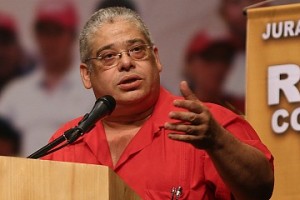Does up mean down in legalese?
 Once in a while, in the privacy of my own home, when no one is looking … I enjoy taking a peek at codes and statutes.
Once in a while, in the privacy of my own home, when no one is looking … I enjoy taking a peek at codes and statutes.
I did it again today. See, one of the more recent controversies the opposition is embroiled in is a legal one – the appointment of PSUV Congressman Carlos Escarrá as General Prosecutor Solicitor General.
As can be expected, chavistas rallied around their candidate after Hugo Chávez expressly asked for him to be appointed. And in typical knee-jerk fashion, the opposition voted against the appointment. Their main argument was that Escarrá was too partisan.
You can say a lot of things about Escarrá – brash, repulsive, and at times, intellectually dishonest – but as far as I know, he has been widely regarded as some sort of expert in Administrative Law for a long time.
Yes, he is hyper-partisan, but who isn’t these days? It seemed to me this was a battle not worth picking. Getting Escarrá and his acerbic verbiage out of the National Assembly qualified as a silver lining in my book.
The opposition, though, has decided to double down. Today, Copei President Luis Ignacio Planas tweeted that Escarrá’s appointment was “fraudulent” because the law expressly forbids “members of a political party” from being appointed SG.
This tweet peaked my interest, so I decided a quick look at the law was in order.
The law, in its articles 38 through 41, says the SG has to be Venezuelan, not related to the President, and a lawyer with a certain level of prestige and academic qualifications. It also says the SG cannot dabble in other non-academic activities, be they public or private in nature.
It says nothing about political party memberships.
Some have argued that Article 249 of the Constitution says that the prerequisites for an SG candidate are the same as those for a judge in the Supreme Tribunal. But the Supreme Tribunal Law, in Article 7, clearly states that in order for someone to be a judge, they have to resign membership in any political party. It doesn’t say you need to be unaffiliated in order to be named a judge.
Maybe I’m not looking at the right articles in the law(s). Maybe I’m too ignorant, not privy to some obscure interpretation of another statute. I’m perfectly willing to accept any of these explanations, and will happily update this post in case I am proven wrong.
But until that happens, my impression is that any member of the MUD making the argument that Escarrá’s professed chavismo is a legal impediment to holding this office … is full of hot air. And if there is one thing we cannot afford anymore, it’s to have habladores de paja as mouthpieces for the opposition.
Caracas Chronicles is 100% reader-supported.
We’ve been able to hang on for 22 years in one of the craziest media landscapes in the world. We’ve seen different media outlets in Venezuela (and abroad) closing shop, something we’re looking to avoid at all costs. Your collaboration goes a long way in helping us weather the storm.
Donate




